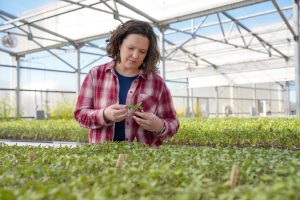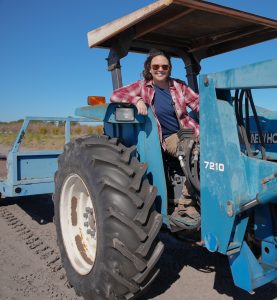Florida, USA
February 13, 2024

Jessica Chitwood-Brown grew up in rural Alma, Arkansas, where she rode horses, fished with her dad and played at the marina.

Jessica Chitwood-Brown in the greenhouse at the UF/IFAS Gulf Coast Research and Education Center. Courtesy, Alice Akers, UF/IFAS.
She also recalls participating in the Crawford County Fair, going to football games on Friday nights, horse shows, rodeos and “everything in between.”
“It was small-town life, you know?” said Chitwood-Brown, the new tomato breeder at the University of Florida Gulf Coast Research and Education Center (GCREC). “Everybody knew everybody, and I couldn’t get away with anything, even if I had wanted to because news would have made it back to my mom before I even got home.”
She stayed in Alma while attending the University of Arkansas-Fort Smith for her bachelor’s degree and later the University of Arkansas-Fayetteville for her master’s degree. Then she moved to the Sunshine State to earn her doctorate at the GCREC, near Tampa.
Chitwood-Brown has come full circle and now runs the lab where she earned that Ph.D. and did her post-doctoral research, in the northern end of Florida tomato country.
Now, as it happens, she’s taking the position of her doctoral adviser, Sam Hutton, at the GCREC.
“I really admire Sam, so I have a lot to live up to,” Chitwood-Brown said. “But I have confidence I can continue to serve tomato growers in the strong tradition of my mentor.”
Jack Rechcigl, director of the GCREC, recalled the great research Chitwood-Brown did while a Ph.D. student and post-doc in Hutton’s lab, and it’s a big reason he interviewed her for the position.
“Jessica learned under a top-notch tomato breeder in Sam Hutton,” Rechcigl said. “We know she’ll continue developing tomatoes that meet the needs of our state’s growers, including varieties that resist pests and diseases. She’ll also work to breed tomatoes with fine flavor and aroma. We’re really excited to see where Jessica takes the tomato-breeding program.”

Chitwood-Brown on a tractor. Courtesy, UF/IFAS.
Now that she’s settled in, Chitwood-Brown wants to improve on the great work of her predecessors, including Hutton and Jay Scott. For instance, her stakeholders – from growers to consumers – may desire different traits in tomatoes.
Hutton released several tomato hybrids last year that were bred to be machine harvestable. These hybrids are currently available for licensing through Florida Foundation Seed Producers.
“This type of tomato has been of interest to the breeding program here for many years because growers have repeatedly expressed their challenge with labor,” Chitwood-Brown said.
She envisions a sustainable and prosperous agricultural system that provides nutritious food while having minimal negative impact on the environment.
Different tomato traits interest different stakeholders, whether you’re talking to growers, consumers or someone else along the supply chain.
Growers need tomatoes that resist disease, live through climate change and produce high yields. Consumers need good shelf life and high quality, such as a nice, dark red color, no defects and a tomato that tastes good.
“Combining these traits requires the full art and science of plant breeding,” Chitwood-Brown said. “We use molecular tools to improve selection for traits like disease-resistance and high lycopene, and we evaluate many, many tomato lines each season to make selections, choose parents, make crosses, etc.”
Artificial intelligence will help her program
GCREC has hired Kevin Wang, an agricultural engineer who specializes in AI, to help with plant breeding. His research should bolster Chitwood-Brown’s search for the best tomato genes.
“I am excited about the opportunities for using AI-based tools to improve selection in the breeding program,” she said. “This is a new field for me, so first, I am focusing on learning what the possibilities are.”
In addition to the AI scientists, Chitwood-Brown looks forward to working with other faculty – including entomologists and plant pathologists — at GCREC to improve tomatoes.
Before being hired at GCREC, Chitwood-Brown worked as a potato breeder at Colorado State University for nearly two years.
“I learned a lot in the short time I was at CSU about running a program, developing relationships with the industry, about making big plans and how to accomplish them. I am excited to make that happen here,” she said.
Now that she’s at the GCREC, it’s time to translate her experience and education with her tomato-breeding goals.
“I want my students — who came with me from CSU — to get started on their projects,” Chitwood-Brown said.
Among many projects Chitwood-Brown is starting are product profiles.
These profiles essentially break down a variety into its parts. They answer the question: What are the traits of a successful tomato variety? This information comes from the stakeholders and gets specific.
“For example, I ask growers to give me a range for how many bins of fruit (or boxes, if we are talking about pack-out) per acre would they find acceptable? What are they getting now? That kind of thing,” Chitwood-Brown said. “These are the basic traits — things a variety has to have to be considered at all.”
However, scientists like Chitwood-Brown know that a new product being as good as, or equal, to a product currently on the market isn’t good enough.
“You want to know what kind of traits would make someone replace a variety that they are currently growing,” she said. “In other words, what traits are missing, what do they want but don’t have? This is the power of a product profile. It helps align the objectives of the breeding program with the needs of the industry.”
Product profiles are living documents. Each season and year, information is added, a new disease emerges, or a trait becomes more important. That brings her back to growers.
“It feels great to hit the ground running with the season starting and getting out and meeting growers and people in the industry,” she said.
ABOUT UF/IFAS
The mission of the University of Florida Institute of Food and Agricultural Sciences (UF/IFAS) is to develop knowledge relevant to agricultural, human and natural resources and to make that knowledge available to sustain and enhance the quality of human life. With more than a dozen research facilities, 67 county Extension offices, and award-winning students and faculty in the UF College of Agricultural and Life Sciences, UF/IFAS brings science-based solutions to the state’s agricultural and natural resources industries, and all Florida residents.
ifas.ufl.edu | @UF_IFAS
WHY FOOD IS OUR MIDDLE NAME
Feeding a hungry world takes effort. Nearly everything we do comes back to food: from growing it and getting it to consumers, to conserving natural resources and supporting agricultural efforts. Explore all the reasons why at ifas.ufl.edu/food or follow #FoodIsOurMiddleName.
About AI at UF
The University of Florida is making artificial intelligence the centerpiece of a major, long-term initiative that combines world-class research infrastructure, cutting-edge research and a transformational approach to curriculum. UF is committed to building the nation’s first AI University by offering artificial intelligence courses to all students in its 16 colleges through our AI Across the Curriculum program. Our faculty and students can analyze vast amounts of data that can impact our country’s biggest challenges with HiPerGator, the most powerful, university-owned supercomputer in the nation.